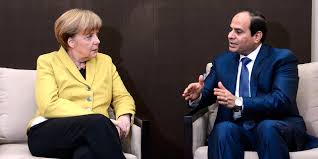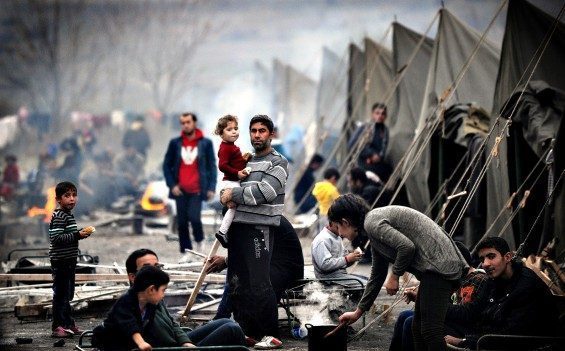
At the time when the Human Rights Watch published an 80-page report highlighting torture, abuses, and various violations of human rights in Egypt’s Scorpion Prison, Berlin and Brussels were pursuing security and migrant deals with Cairo, according to the Deutsche Welle.
According to the Human Rights Watch report, “Prisoners are routinely tortured and human rights often ignored in Egypt,” It added,” inmates are confined in overcrowded cells without beds, not allowed to see their families and subjected to physical beatings and mental abuse.
In the same context, Amnesty International report published a similar study in July on the unprecedented spike in forced disappearances and abuses in Egypt’s prisons.
Independent journalists like Cairo-based Sofian Naceur confirmed to DW that conditions in Egyptian jails are “catastrophic.”
In the same context, Roba Hesham, the daughter of detained journalist Hesham Gaafar, said that her father was detained last October after calling for more democracy in Egypt, though the official charges against him were for membership in the Muslim Brotherhood. Roba denied the allegations against her father.
Hesham Gaafar was kept in solitary confinement for months and visits limited to five minutes, Roba said. “He didn’t even have a bed,” she said, adding that her father is only spared torture because he is a well-known journalist. “If no one knows you, you suffer.”
In response, there have been many protests against the abysmal conditions inside Egyptian prisons as well as reports from human rights organizations. However, “Despite the reports by rights groups detailing abuses in Egypt, the German and Egyptian interior ministries have been negotiating a security cooperation agreement since 2014,” said DW.
Moreover, the German Chancellor Angela Merkel has recently suggested a deal between the EU and Egypt, along the lines of the pact reached by the bloc and Turkey, to stem the number of refugees trying to enter Europe.
DW said that, “the German government defended its efforts by citing humanitarian concerns and political realism.”
German Foreign Ministry spokesman Martin Schäfer explained Germany’s stance saying, “We’re well advised not just to conclude deals with countries that share all of our values – otherwise we’d only sign agreements with Liechtenstein and maybe the United States.”
He continued,”We have the opportunity to reach agreements with countries with which we share common interests but with which we also have political conflicts. That’s definitely the case with the human rights situation in Egypt.”
Schäfer added that one aims of the proposed pact was to combat human trafficking and that it is not ignoring the state of human rights in Egypt.
Since the military coup led by Abdul Fattah al-Sisi in June 2013, against Egypt’s first democratically elected President Mohamed Morsi, the Egyptian authorities launched massive crackdown on human rights activists, opposition, journalists and trade Unions. The authorities have killed more than 1,000 people and jailed some 40,000 since he seized power in 2013.
Will the Refugee Deal with Al-Sisi regime be Effective?
Egypt has become one of the dangerous spots used by migrants to sneak to European borders. Bigger boats are increasingly setting out from Egypt for sea voyages of up to 10 days toward Italy, as the EU, NATO and Turkish coast guard tighten controls in the Aegean Sea after Brussels and Ankara reached a deal to keep refugees in Turkey in exchange for 6 billion euros in aid and eventual visa-free travel for Turks visiting the EU.
As a result, the coastline near the port city of Alexandria is now a preferred jumping off point. Experts stated that some migrants, many of them Syrian, pay up to $5,000 to travel from Egypt in vessels. Then, the vessels, filled with migrants, meet up south of Italy with smaller boats coming from Libya and bound for the Italian coast so that the passengers can transfer illegal immigrants. Experts claimed some Egyptian policemen are involved in the disastrous situation as they are thought to be working with the smugglers.
In response, Naceur said that since last year Egypt has stepped up patrols and arrests on its coastline. Nonetheless, ‘he argued that an Egyptian pact with the EU on refugees would only worsen the situation by providing money to an ineffectual and corrupt government.”
He also estimated that Egyptians would make up 30%of the 120,000 refugees trying to reach the EU via Egypt this year.
He added, “The economic crisis is getting worse, and the government has no plan to deal with it.”
He added, “So you can expect those numbers to rise dramatically. Those who will suffer from a refugee deal are Egyptian citizens who want to leave and have no hope or future perspectives because of poor government management.”
In fact, the European governments have essentially given al-Sisi a free hand on domestic Egyptian issues, he said.
“Since 2014, the Egyptian president has been courted by the EU,” Naceur said.
“He has signed lots of political, security and economic agreements, and human rights abuses here have continued on every level. Torture is common, there’s lots of corruption in the security apparatus, and researching journalists are denied entry into the country.”
A pact on refugees with the EU has its roots in and would legitimize a controversial potential deal between Germany and Egypt on security issues, however al -Sisi regime didn’t make any achievement that can be recorded.
Germany Deal with Al-Sisi isn’t Weird
Since 2014, Germany and Egypt have been working on a security-cooperation agreement. In addition, German Interior Minister Thomas de Maiziere has met with his Egyptian counterpart Magdy Abdel Ghaffar multiple times this year.
Maiziere has called Egypt an “indispensable ally in the fight against terrorism and illegal immigration.”
“It is unclear how close the two countries are to reaching an agreement – or whether one might already have been completed, “said DW.
In response to a query by DW, Germany’s Interior Minister spokesman Johannes Dimroth said he would have to check the current state of the negotiations.
He added that human rights concerns were always taken into consideration when negotiating deals.
In fact, Germany has 24 security agreements with various countries from Albania to Vietnam. The German government said “it has never refused to conclude such an agreement with a country based on human rights concerns.”
Accordingly, a possible German-Egyptian cooperation agreement could see Germany providing assistance to Egyptian police on terrorism, illegal emigration to Europe and security at mass events like football matches.
“But critics have said it would also link Germany with Egypt’s repressive mechanisms of state,” reported DW.
“In Egypt’s case, Germany is proposing to cooperate not just with the police but with the secret service apparatus,” Naceur said.
He added, “That’s extremely dubious because it’s clear to everyone concerned that the service has blood on its hands. An agreement would bolster the government, and Germany would be investing money in a police apparatus that isn’t willing to reform itself, a state within a state that no one would be able to monitor.”
On the other hand, Germany’s political opposition has harshly criticized the possibility of closer cooperation between the German and Egyptian interior ministries. Left Party deputy Andrej Hunko has equated it with “being an accessory to repression and strengthening state terror in Egypt.”
Green party co-chair Cem Özdemir released a general statement saying, “a Marshall Plan for Northern Africa” might help address then problems underlying the refugee crisis but that Germany had to be careful “not to let money drain away to authoritarian regimes.”
Germany Security Deals with Al-Sisi Regime
Last July, Egypt and Germany have signed a number of security cooperation agreements.
The agreements address a number of areas, including illegal immigration, counter-terrorism, and securing airports.
According to the statement, Abdel Ghaffar signed an intelligence-sharing agreement, an extradition agreement including Interpol Red Notice warrants and an agreement that would see Germany train Egyptian security personnel to investigate financial crimes.
The statement also stated that the two ministers held talks at the German interior ministry headquarters in Berlin to review aspects of cooperation between the two ministries.
The German Interior Minister Thomas de Maizière visited Cairo at the end of March for two days. During the visit, he discussed ways to enhance cooperation in areas such as security, counter-terrorism, airport security, and immigration.
Moreover, German vice-chancellor and minister of economic affairs Sigmar Gabriel announced that potential arms deal with Egypt during a press conference held in Cairo in April 2016.
Gabriel said at the press conference that “The Egyptian government did not ask Germany for a weapons deal during this visit, but there was a discussion about supplying two naval submarines. We are ready to fully cooperate with Egypt to secure its borders with Libya.”
Germany announced the naval submarine deal in 2012. Under the initial terms of the agreement, Germany would export four state-of-the-art military submarines to Egypt. On 10 December 2015, Germany completed the first submarine, according to the state-owned MENA news agency.
Despite the difficult financial economic crisis, the Egyptian government signed several arms deals with European countries.
Stockholm International Peace Research Institute (SIPRI), an international think-tank based in Sweden, documented in a report that Egypt’s arms imports rose by 37% between 2006 and 2010, and 2011 and 2015.
SIPRI calculates that the value of arms transfers to Egypt in 2015 reached US$1.475bn, compared to US$686m in 2010 and US$368m in 2014.
Gabriel said that, due to the current security situation, Egypt has “legal rights to ask for weapons.”
According to the latest German arms exports report, despite restrictions imposed on the international sale of weapons for nearly 15 years to enhance peace worldwide, Germany became the world’s fourth-largest arms exporter in 2015.
Recently Germany has approved several arms deals with a number of Arabian Gulf States, including Oman and the United Arab Emirates, according to Gabriel’s letter to lawmakers in the Bundestag, the lower house of the German legislative body.



